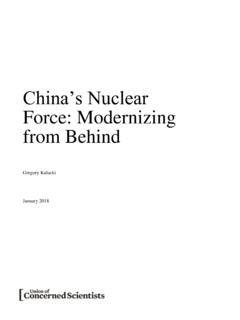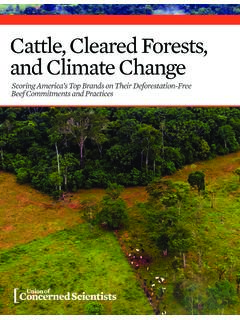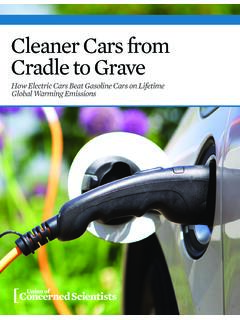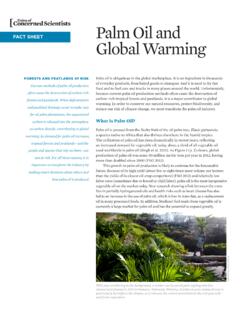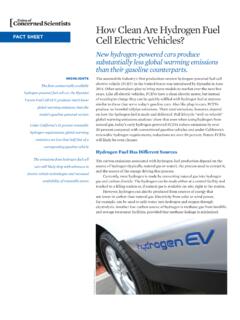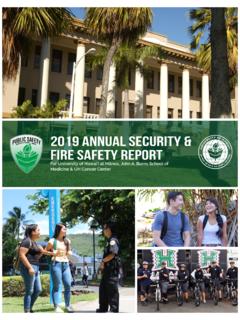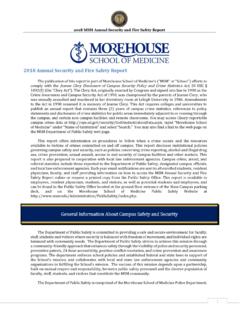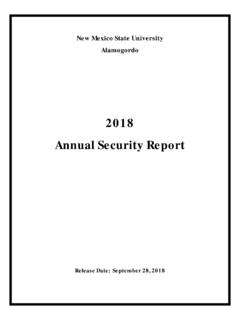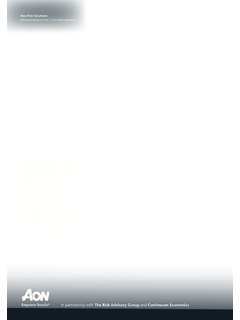Transcription of 2018 ANNUAL REPORT - ucsusa.org
1 2018 ANNUAL REPORTS cience for a healthy planet and safer world2 | 2018 ANNUAL REPORTS cience-based policies protect people and our planet. At UCS we work to reduce global warming emissions; to develop sustainable food, power, and transportation systems; to fight the suppression, censorship, and manipulation of science; and to reduce the threat of nuclear war. You our supporters have been the driving force behind our work for nearly 50 SCIENCE INTO ACTION2 | 2018 ANNUAL REPORTAt the time of this writing, we don t know the results of the midterm elections and whether candidates who vowed to restore science to its rightful place in public decisionmaking prevailed. What we do know is that UCS staff, partners, and supporters poured their all into rallying as many people as we could to vote for science and the public good this s been a tumultuous but productive year, as our scientists and advocacy staff pushed to expand access to clean energy and transportation, reduce the threat of nuclear war, prepare people and communities for the impacts of climate change, and build a healthier food system.
2 We ve also worked tirelessly in opposing the anti-science policies proposed by the Trump administration, with every tool at our disposal. Of course, we d much rather be making progress than re-fighting battles we ve already won. Nevertheless, our strategies for blocking many of the worst abuses of science have proven quite effective, as you ll read in the pages ahead. We hope this REPORT shows just how much your support helped us accomplish over the past year, even in the face of an intractable administration and Congress. We are energized, revitalized, and inspired anew by your commitment to stand up for science, and your dedication to UCS. There are heroic victories for a safer and more sustainable world in the pages ahead, and you are part of every one of them. A MESSAGE FROM THE PRESIDENT & CHAIRWe re proud of our part in an unprecedented show of strength and public engagement by the scientific commu-nity and all who believe that facts, evidence, and expertise matter.
3 We re also profoundly grateful to you for making this work ANNUAL REPORT | 3 KEN KIMMELL PresidentANNE R. KAPUSCINSKI Chair4 | 2018 ANNUAL REPORTDEFENDING SCIENCE FROM ATTACKSUCS is fighting the Trump administration s attacks on science up to 60 by our last count (which you can read about on the UCS website). Defending the progress we have made on so many fronts is a daunting task, but thanks to our active supporters we successfully warded off many bad outcomes over the past Science Network members provided the vocal backing we needed to defeat the appointment of three nominees for top agency posts who were each categorically unfit for their roles: a former talk radio host with no scientific training for chief scientist at the USDA, a chemical industry advisor for head of chemical safety at the EPA, and a climate change denier and fossil fuel advocate for head of the Council on Environmental January, our REPORT documenting how the Trump administration has sidelined federal science advisory committees drew the attention of two key senators.
4 At their request, the Government Accountability Office expanded an investigation into whether political appointees at the EPA had improperly influenced the selection of committee members. And when the Trump administration proposed a budget that would drastically cut research at multiple federal agencies, and members of Congress added provisions that would make it harder to enforce environmental laws, UCS experts educated the press and the public about what was at stake, and our supporters applied direct pressure to their legislators. As a result, the final budget preserved funding levels and even increased them in some cases, and nearly all the poison pill provisions were also saved the federal electric vehicle tax credit, funding for United Nations climate research, a NASA climate monitoring system, and the scientific foundation of the Endangered Species Act from the chopping block, and helped prevent several under-the-radar but potentially disastrous pieces of anti-science legislation from coming to a SCIENTIST MAKES HER VOICE HEARD The most vulnerable groups in the United States would suffer from the Trump administration s push to roll back important environmental regulations.
5 I felt it was necessary to make my voice heard and advocate for underserved groups. As a scientist or engineer, it s normal to feel nervous when considering or participating in advocacy, but UCS provides great resources to help, and myriad opportunities for involvement that suit your preferences. Since 2017 I have worked with UCS on many occasions, including speaking with Nevada senators about clean vehicle technology, and I felt empowered and useful because my expertise was directly used for influencing political action. CESUNICA E. IVEYASSISTANT PROFESSOR, UNIVERSITY OF CALIFORNIA RIVERSIDE,UCS SCIENCE NETWORK MEMBER6 | 2018 ANNUAL REPORTThe Trump administration and its industry allies moved to sideline science whenever the evidence threatened to interfere with their agenda. UCS pushed back with every tactic we have honed in our nearly 50 years of AND ANALYSIS UCS determined that an EPA plan to ease the regulatory burden on certain polluters threatened to increase toxic air pollution by as much as 25 percent.
6 We exposed anti-science positions taken by the US Department of Agriculture s new leadership, and glaring technical flaws in a REPORT issued by the automakers trade association to argue for weaker fuel efficiency and emissions SURVEYS To assess the state of science in the federal government, UCS has been surveying agency scientists since 2005. Our 2018 survey revealed that staff cuts and censorship are affecting agencies ability to protect public health and the environment; many scientists also reported that agency leadership is unqualified or even hostile to the agency s REQUESTST hrough the Freedom of Information Act, UCS exposed the political motivation behind the EPA s attempt to exclude independent health analyses from its decisionmaking. The resulting outcry forced the EPA to allow more public input into that policy. We also uncovered the Trump administration s suppression of a government study showing that certain toxic chemicals prevalent on military bases endanger health at levels much lower than the current standard.
7 Our work prompted the study s By bringing scientific evidence into the courtroom, UCS is bolstering several legal challenges to reckless EPA actions. Together with allies, we persuaded a federal court that the EPA must implement an Obama administration rule to protect communities from chemical disasters; in two other cases we are suing to block the rollback of vehicle standards vital to combating climate change (see p. 15) and to stop the elimination of independent scientists from science advisory boards in favor of industry BUILDING UCS brought more than 130 science advocacy organizations together to launch Science Rising, a long-term effort to elevate the importance of science in policymaking. We trained scores of scientists to organize their peers, and deployed thousands of UCS supporters ahead of the midterm elections. OPPOSING CORRUPTION AND CRONYISMIn April, UCS brought scientists and technical experts from eight states to Washington, DC, for meetings with their elected representatives on the importance of funding government research.
8 The effort paid off see p. | 2018 ANNUAL REPORT2018 ANNUAL REPORT | 9 To build the broad coalition of people we need to spur government action on climate change, UCS reaches out to people of all backgrounds, helping them understand that the impacts of climate change are already here, and directly affecting all of extreme weather events such as hurricanes justifiably get the headlines, UCS has spent the last two years educating coastal communities about the growing threat of tidal flooding caused by rising seas. In 2017 we showed the enormous scale of the threat: 170 communities could be chronically inundated in less than 20 years. And in 2018 we analyzed the value of the property at risk: more than 300,000 homes currently valued at $ billion could be lost within the life span of a 30-year mortgage issued today. The REPORT Underwater: Rising Seas, Chronic Floods, and the Implications for US Coastal Real Estate was cited by the media more than 1,000 times in just over two months, in national outlets (ABC, CBS, CNN, Telemundo, Univision, USA Today, and the Wa shin g ton Post among others), a broad swath of local markets around the country, as well as trade publications for industries UCS had never engaged before, including building design and construction, insurance, mortgage banking, and real estate.
9 UCS has been working to ensure this information gets into the hands of people in the communities often hit the hardest by climate impacts communities already overburdened by a history of neglect or discrimination. We presented the REPORT s findings at a conference of Hispanic and Native American journalists in Miami and at a meeting organized with allies in Houston who are still recovering from Hurricane Harvey. Earlier in the year we co-sponsored a conference in Arizona devoted to climate impacts on tribal culture, and a discussion among experts in Oakland about the intersection of climate change, infrastructure, and environmental NEWAUDIENCES TO CLIMATE RISKS10 | 2018 ANNUAL REPORTD espite the Trump administration s efforts to prop up the country s oldest and dirtiest power plants, the market for clean energy continues to expand. UCS helped accelerate that expansion in numerous venues during the past Golden State committed to generate all of its electricity from 100 percent carbon-free resources by 2045, and UCS and our allies made it possible.
10 Beginning two years ago, we conducted sophisticated modeling to show that California could make the switch while also growing one of the world s biggest economies, and our experts work proved critical in persuading the legislature that the state s electricity grid could reliably run on clean also helped put Michigan on the path to a modern electricity grid our advocacy ensured the state s utilities will follow through on recent commitments to increase their use of renewable energy and energy efficiency, and give fair and robust consideration to battery storage and carbon emissions WINDF ueled by a 2016 law UCS supported, Massachusetts utilities signed a contract for 800 megawatts (MW) of new offshore wind energy enough to power almost 500,000 homes at a price about half what was anticipated. Rhode Island announced a 400 MW offshore wind contract the same day, and Connecticut soon followed with a 200 MW deal.
